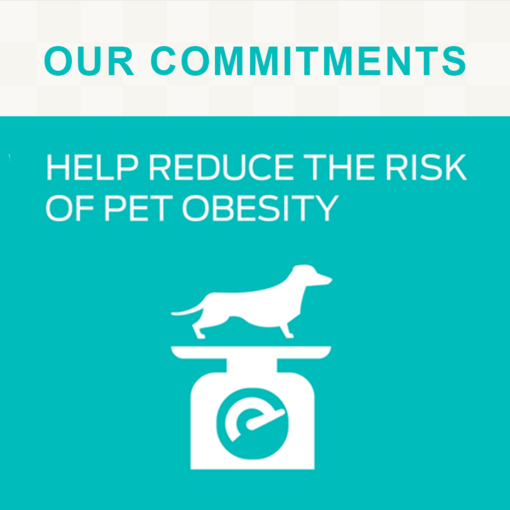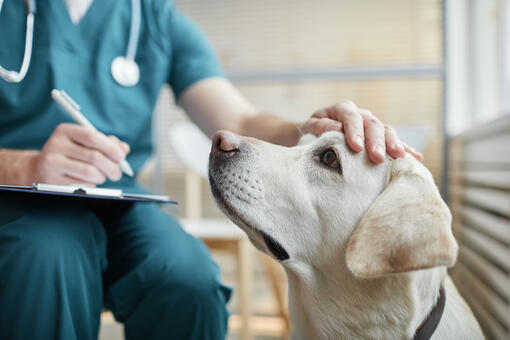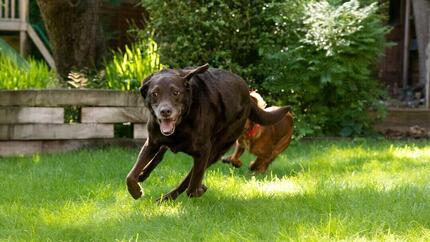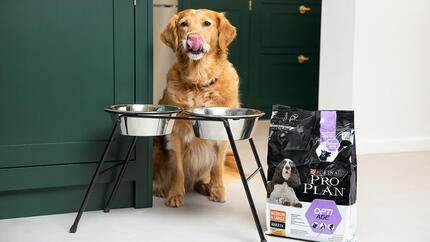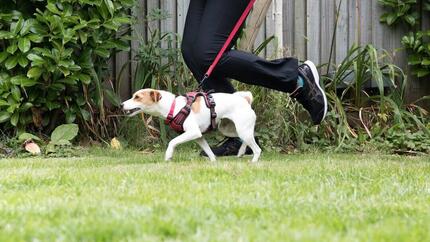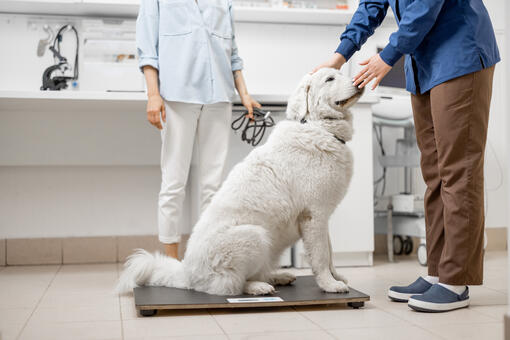
Keeping your elderly dog at a healthy weight is super important. Just like us, senior dogs often get less energetic as they age and so are prone to weight gain. This may mean they don't need as much food or that they need a change of diet. Extra weight can make older dogs less active and mobile, and even worse; it is associated with health problems like osteoarthritis, diabetes, and some cancers – along with difficulties breathing, and a reluctance to exercise or play.
Sudden weight loss can also be a sign of underlying health issues, so it's important to monitor your dog's weight closely. We'll discuss how to recognise the signs of weight changes in your senior dog and provide tips on how to maintain a healthy weight throughout their golden years.
Understanding Weight Changes in Older Dogs
Changes in Metabolism and Activity Levels in Senior Dogs
As your dog gets older, several things happen that affect their metabolism. Here's how ageing slows things down:
Muscle Loss: Muscle is the engine that burns calories. Sadly, as dogs age, they tend to lose muscle mass, especially if they're not as active. This means their bodies naturally burn fewer calories even when resting.
Decreased Physical Activity: Older dogs often become less playful and energetic. This decline in activity level further reduces the number of calories they burn throughout the day.
All these factors combined mean that senior dogs need fewer calories compared to when they were puppies, and sometimes adulthood. If they continue to eat the same amount of the same foods, those extra calories get stored as fat, leading to weight gain.
Common Health Issues That Might Impact Senior Dogs Weight
Keeping your senior dog at a healthy weight is crucial, but it can be tricky sometimes as they become more susceptible to certain health problems. Here's a closer look at some of the most common issues senior dogs face:
The pain and stiffness from arthritis can make exercise difficult for your dog. Exercise is a great way to burn calories, so limited activity due to arthritis can make weight loss, if needed, challenging.
Managing diabetes often involves medication and a carefully controlled diet. Some pets will have lost weight by the time their diabetes is diagnosed, and will need to be helped to re-gain weight, and others may be overweight, and need to lose some weight, so veterinary guidance can be helpful on your pet’s individual weight management.
This condition slows down the metabolism, making it harder for your dog to burn calories. Even with a controlled diet, weight loss can be challenging with hypothyroidism.
Senior dogs with heart problems, specifically congestive heart failure, may not be able to tolerate very strenuous exercise, which can limit calorie burning.
Advanced kidney disease can sometimes affect a dog's appetite, making it difficult to control calorie intake.
These health issues can definitely complicate weight management. However, it's important to remember that even small improvements in weight can make a big difference for your senior dog's health. Work with your vet to develop a safe and effective weight management plan that considers your dog's individual needs and limitations.
Signs of Healthy and Unhealthy Weight Changes
Healthy weight changes for older dogs happen slowly and come with positive signs. When losing weight, your dog should have more energy, look better, and gradually become slimmer. So, check these signs to find out if your elderly dog is losing weight? If your dog is gaining weight, they should eat more, look fuller, and put on weight steadily.
Unhealthy weight changes are quick and often come with worrying symptoms. Rapid weight loss or weight gain in older dogs, less activity, trouble breathing, and muscle loss are all red flags. If you see any of these, it's important to see your vet right away.
It's best to talk to your vet before making big changes to your dog’s diet or exercise routine. They can give you advice on getting and keeping a healthy weight for your older dog. Regular check-ups help track your dog's progress and find solutions to any problems.
Role of Senior Dog Food and Weight Control
As our canine companions age, their dietary needs change. Like us, senior dogs often experience a decrease in activity level, which can contribute to weight gain. To support their overall health, it's crucial to provide a diet specifically formulated for older dogs. Whilst, on the other hand, some senior dogs might encounter weight loss due to underlying health issues. In these cases, a specialised diet designed to promote weight gain can be beneficial.
To address these varying needs, there are specific senior dog food options available. By selecting the right diet for your ageing friend, you can help them maintain a healthy weight and enjoy a happy, comfortable retirement.
Benefits of Senior Dog Food for Weight Management
Senior dog food is formulated with the specific needs of older dogs in mind. These formulas often contain:
- Reduced Calories: to help maintain a healthy weight and avoid obesity.
- Higher Quality Protein: helps maintain muscle mass and is easier to digest.
- Joint Supportive Ingredients: both glucosamine and omega-3 fatty acids can be found in senior food which can help maintain healthy cartilage and joints.
Key ingredients to look for:
- Highly Digestible Protein Sources: chicken, fish, or turkey that are easier for senior dogs to digest.
- Healthy Fats: Omega-3 and omega-6 fatty acids are important for skin and coat health, as well as cognitive function. Look for foods that include sources like fish oil.
- Fibre: can aid digestion and help your senior dog feel fuller for longer.
As your dog ages, you might find that changing their feeding schedule is more beneficial for them, feeding them smaller amounts more frequently so their digestive systems are not put under the stress of large meals. Purina’s Vet expert Adam Rampling adds "A healthy diet is vital for senior dogs. High quality, complete, senior foods are specially adapted to suit the needs of ageing dogs."
Find out more info on how to feed your senior dog with Purina.
Differences Between Regular and Senior Dog Food to Help Your Dog Maintain a Healthy Weight
| Feature | Regular Dog Food | Senior Dog Food |
| Calorie Content | Higher | Lower |
| Protein Content | Moderate to High | Higher Quality Protein, may be higher content |
| Fat Content | Moderate to High | May be Lower |
| Joint Supportive Ingredients | Not Typically Included | Often Include Glucosamine |
Remember to always consult your vet before switching your senior dog's food. They can help you choose the right formula based on your dog's individual needs and health conditions.
Exercise for Older Dogs
While a dog can be considered a senior from the age of seven, many remain active and don’t require immediate adjustments to their exercise routine. However, for older dogs with mobility issues or underlying health conditions, whilst it’s crucial to maintain physical activity for their overall health, we must adapt their exercise regimen accordingly.
Here are some fun ways to keep them active without straining their bodies:
Walking
Shorter, more frequent walks are often preferable to long, single outings. For dogs with limited mobility, consider using a dog stroller or a front-clip harness to provide support. Always choose flat, even terrain and avoid challenging conditions like hot pavement or slippery surfaces.
Swimming
This low-impact exercise is a wonderful option for senior dogs with joint pain. Hydrotherapy can help keep joints mobile. Consult your vet to find a reputable canine hydrotherapy pool near you.
Gentle Play
Avoid games that require sudden stops or turn (such as chasing balls or frisbees. Instead introduce low impact games such as following scents and finding hidden objects. If your dog loves tug of war games, keep these gentle, let them pull you rather than the other way round and don’t lift the toy upwards.
Indoor Activities
Rainy days? No problem! Enrichment games and puzzle toys with treats or "Hide the Toy" indoors are great ways to keep your dog active without going outside.
Remember: Always listen to your dog. Watch for signs of fatigue like panting, lagging, or loss of interest. Take frequent breaks and offer plenty of fresh water. It's important to consult your veterinarian before starting any new exercise routine, especially if your dog has any underlying health conditions. Rapid weight loss in an old dog is often a cause for concern and requires immediate veterinary attention. They can help you create a safe and effective exercise plan tailored to your senior dog's needs and limitations.
Benefits of Regular Vet Check-Ups for Senior Dogs
Regular vet check-ups are essential for maintaining your senior dog's optimal health, including their weight. Sudden weight loss in older dogs can be a sign of an underlying health issue and should prompt an immediate visit to your vet. A professional can accurately assess your dog’s body condition, create a tailored weight management plan, and detect early signs of weight-related health problems. By working closely with your vet, you can help your senior companion achieve and maintain a healthy weight.
Conclusion
As our dogs age, their care requires adjustments. Veterinarian-approved senior food ensures essential nutrients, promoting healthy weight, muscle strength, and joint support. Gentle activities like walks, swimming, or playtime keep them mobile and engaged. Maintaining a healthy weight is vital, reducing stress on joints and allowing them to enjoy their golden years. Remember, regular veterinary check-ups are crucial for early detection of any health concerns.
By prioritising these simple yet vital aspects of senior dog care, we can ensure our dogs experience a long, healthy, and joyful life by our side.


